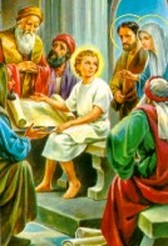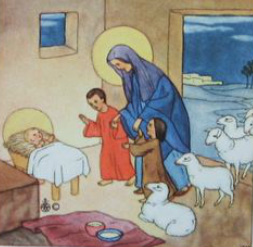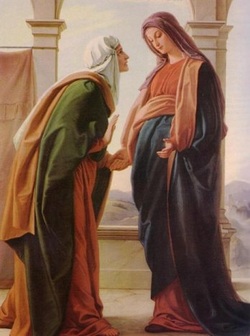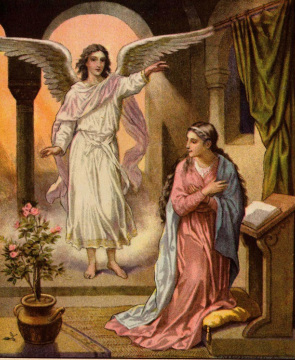
A month passed away, and then Mary and Joseph prepared to go up to Jerusalem for the double ceremony of Purification and Presentation required by the Jewish Law. Our Lord was Himself the Lawgiver, and, therefore, not bound by the Law; but He wanted to be like us as far as possible that He might help us more and be our Model in all things. He came to teach us all, and to teach Mary first, who was to profit most by His lessons. No one has ever imitated Him as she did, because no one has ever studied Him so closely. From the first we are told that she pondered in her heart all that happened to Him and all that He said and did. And then she tried to copy Him. When she saw Him submitting to laws to which He was not obliged, she joyfully did the same, and on the day of her Purification went up to the Temple to offer a sin-offering for herself and her Divine Child. The sacrifice of the rich was a lamb and a turtle-dove or young pigeon. Those who could not afford a lamb took two doves. Mary was poor and made the offering of the poor. But she made a rich Offering too, richer than that gorgeous Temple had ever seen.
The Law required the eldest son of each Jewish family to be presented to God and consecrated to Him. The babe was put into the arms of the priest and solemnly lifted up towards Heaven. Then it was bought back by the parents for five silver shekels, about four dollars in our money.
On the fortieth day, then, after His birth, Mary took the Holy Child in her arms, and folding her veil closely round herself and Him, set out for Jerusalem. Joseph carried the doves in a wicker basket, and the silver shekels.
Solomon's Temple was the most glorious building the world has ever seen. It was destroyed when the Jews were taken into captivity by Nabuchodonosor the Great. The Second Temple was built on their return from captivity, and, at the time of our Lord, it had been restored by the Herod whom history calls " the Great." He was a selfish, wicked man, whose one thought was to keep the throne of Judea which the Romans had given him, and to put to death anyone and everyone who might be a possible rival. His people feared and hated him, and it was to turn away their attention from his cruelty that he restored the Second Temple on so magnificent a scale, that in some respects at least it equalled or even surpassed the First.
Four Courts, open to the sky, rose one above the other on Mount Moriah. The lowest and largest was called the Court of the Gentiles, because it was open even to pagans. But no Gentile, under pain of death, might pass beyond; the rest of the Temple was reserved for the people of God. Fourteen steps led to the Court of the Women, so called because women might not go further except when they went with an offering for sacrifice into the Court of Israel. Highest of all was the Court of the Priests. In this enclosure stood the altar of holocausts, the brazen laver, and a building of snowy marble roofed with gold. It consisted of two rooms; one called the Holy Place contained the altar of shewbread, the altar of incense and the seven-branched candlestick.
Beyond this room, and separated from it by a rich curtain, was the chamber called the Holy of Holies. In Solomon's Temple this sanctuary held the Ark of the Covenant, containing the two Tables of the Law, Aaron's rod which had blossomed, and a pot of manna. After the destruction of the First Temple the Ark of the Covenant was lost, and in the Second Temple only a black stone marked its place within the Holy of Holies. Into this sacred spot none but the High Priest entered, and he but once a year on the Day of Atonement, when, after filling it with the smoke of incense, he went in with the blood of victims to pray God to forgive the sins of the people.
No place was so dear to a true Israelite as this Temple of the Lord. David cried out: "How lovely are Thy tabernacles, O Lord of Hosts, my soul longeth and fainteth for the Courts of the Lord." To pray within these sacred Courts was their greatest happiness, and every Jewish boy looked forward with eagerness to his twelfth birthday, because thenceforth he would be bound to go up three times a year at the great feasts to worship there. When, after days of weary march, pilgrims climbed Mount Olivet, and from its summit caught sight of Mount Moriah and the golden roof of the Holy Place glittering in the sunshine, they forgot all the fatigues of the journey and broke out into loud songs of joy and praise.
Herod's Temple, it is true, lacked that which had made Solomon's so glorious. The Ark of the Covenant was gone, and the bright cloud above it which showed the Presence of God in the Holy of Holies. But had not Aggeus comforted his people by telling them that this Second Temple would be more hallowed than the First, because the Lord of the Temple would Himself visit and sanctify it?" Great shall be the glory of this last house more than of the first. The Desired of all nations shall come, and I will fill this house with glory, saith the Lord of Hosts."
These words of the prophet must have been in the thoughts of Joseph and Mary when, with the Infant Jesus, they presented themselves at the foot of the steps which led to the highest of the Temple Courts. A priest came down to receive their offering. They gave him the shekels, and then Mary laid her Child in his arms to be offered to God. This was no mere ceremony. The Divine Infant begged to suffer in our stead the punishment our sins deserved, and His offering was accepted. He was indeed given back to Mary, but as a little lamb to be kept for sacrifice later.
Having done all things according to the Law, Mary and Joseph were turning to leave the Temple when a venerable old man came forward, took the Holy Child into his arms, and, smiling upon Him, gazed long and earnestly upon the little face, whilst tears of joy trickled down his cheeks. Mary watched and wondered. Here, then, was another that knew her secret, and had come forward to worship the Hidden God. Such a smile of welcome, such a loving embrace! the old man might have known the Child and been expecting Him. And so in truth he had. For this was the aged Simeon who had been promised that he should not die until he had seen the Christ of the Lord. God always gives more than He promises. Simeon was to see the Child, and here he is, not seeing only, but holding and fondling Him, and knowing what is to befall Him.
But God expects us to trust Him; He often keeps us waiting for a long time. Day after day Simeon had come into the Temple praying and hoping; day after day he had gone away disappointed and a little weary of waiting. This day, just at the right time, the Holy Spirit put it into his mind to go there, just at the right moment made him lift his eyes and fix them on that Child in the young mother's arms. There was nothing about the Holy Family to attract notice—a poor couple presenting their first-born, bystanders would have said. But the aged priest saw by faith what others could not see, and in a transport of joy blessed God and said:
"Now Thou dost dismiss Thy servant, O Lord, according to Thy word in peace. Because my eyes have seen Thy salvation, which Thou hast prepared before the face of all peoples: a light to the revelation of the Gentiles, and the glory of Thy people Israel."
Then, turning to Mary, he went on in tones of sorrowful compassion: " Behold this Child is set for the fall and for the resurrection of many in Israel, and for a sign which shall be contradicted. And thy own soul a sword shall pierce, that out of many hearts thoughts may be revealed."
Joy and sorrow come together all through Mary's life. She has just had the happiness of presenting to God an offering worthy of Him. She has seen her Child welcomed as the Messiah. And now, suddenly and unexpectedly, all is changed. The day that began so brightly is dark with coming woe. He whom she loves more than her life is to be contradicted, and so cruelly used, that her soul will be pierced with sorrow. But because this terrible future is God's Will for her Son and for herself, she bows her head and says once more: "Behold the handmaid of the Lord, be it done unto me according to His Will."
There is still another meeting to-day. Whether Anna, the aged prophetess, knew of the promise to Simeon and kept near him, hoping to have a share in his joy, we are not told, but we know that "she departed not from the Temple, by fasting and prayers serving night and day." And thus it happened that when he went forward and took the Child Jesus into his arms, she followed and joined the group, and not only adored in silence, but spoke of the Child to all around who were expecting the Redeemer. The only persons that we know of who preached and praised Him in that glorious Temple of His were this aged woman, at the beginning of His life, and the fearless children with their Hosannas six days before the end.
A printable file of this chapter as well as a coloring picture can be found below.
|
| ||||



 RSS Feed
RSS Feed